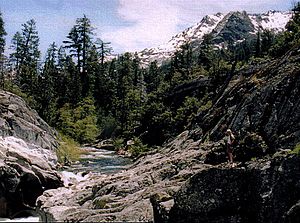Rubicon River (California) facts for kids

The Rubicon River is an important river in Northern California. It flows through the beautiful Sierra Nevada mountains, west of Lake Tahoe. This river is about 60 miles (97 km) long. It collects water from an area of about 184 square miles (477 km2). This area is called its watershed.
The river starts high up in the Crystal Range mountains. This part of the Sierra Nevada is inside the Eldorado National Forest's Desolation Wilderness. A long time ago, people called the Rubicon River the South Fork of the Middle Fork of the American River.
Where the Rubicon River Starts
The Rubicon River begins its journey high in the mountains. It starts at about 9,900 feet (3,018 meters) above sea level. This spot is near Clyde Lake in El Dorado County.
From there, the river flows north-northwest for about 8 miles (12.9 km). It then reaches the Rubicon Reservoir. After the reservoir, the river continues flowing northwest. About 4.8 miles (7.7 km) later, other streams join it. These streams include Highland Creek, Miller Creek, and the Little Rubicon River. The river then flows about 5 miles (8 km) more to Hell Hole Reservoir.
The South Fork of the Rubicon River
After leaving Hell Hole Reservoir, the Rubicon River turns southwest. For a while, it forms the border between El Dorado and Placer Counties. Here, it meets the South Fork of the Rubicon River.
The South Fork of the Rubicon River starts near Loon Lake. It flows southwest for several miles. Then, Gerle Creek joins it. The South Fork then travels west. Finally, it meets the main Rubicon River.
The Rubicon River slowly changes direction again. It eventually heads northwest. It joins the Middle Fork of the American River. This meeting point is about 20 miles (32 km) northeast of Auburn. The Middle Fork then meets the North Fork of the American River. This happens below the Foresthill Bridge. All this water then flows into Folsom Lake.
Fun Activities on the River
The reservoirs and trails along the Rubicon River are popular places for outdoor fun. These areas are managed by the Eldorado National Forest. People enjoy visiting these spots for different activities.
 | Charles R. Drew |
 | Benjamin Banneker |
 | Jane C. Wright |
 | Roger Arliner Young |

